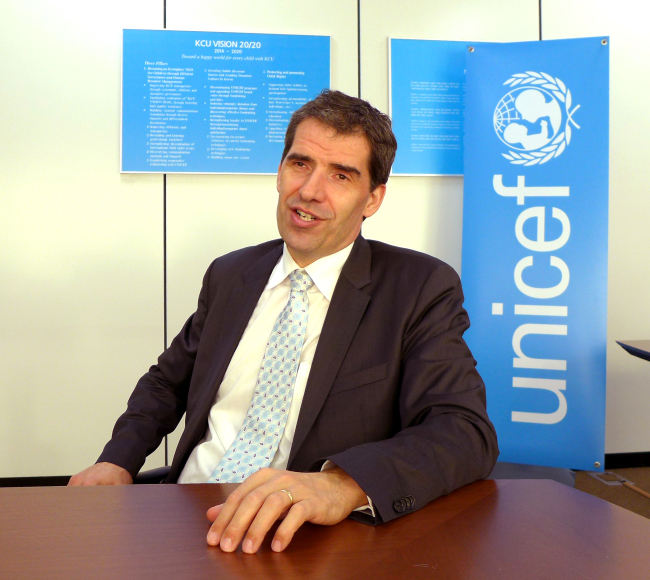Following the adoption of the U.N. Sustainable Development Goals last year, the United Nations Children’s Emergency Fund is stepping up humanitarian efforts around the world and garnering Korea’s critical support, a senior agency official said last week.
Coinciding with the 70th anniversary of UNICEF, director of public partnership division Olav Kjorven came to Korea to strengthen collaboration.
“As Korea is becoming an increasingly important player in international affairs, UNICEF values the dialogue we have with the Korean government,” Kjorven told The Korea Herald at the Korean Committee for UNICEF on Thursday.
“Korea rapidly rose from the Korean War (1950-53) and transformed itself from a recipient to a donor in official development assistance. This is an extremely inspiring and fascinating story.”
 |
Olav Kjorven, director of public partnership division at UNICEF (Joel Lee / The Korea Herald) |
As Korea still has the memory of moving from poverty to prosperity, its knowledge and experience are regarded valuably aside from its financial assistance, he stressed. Referring to Norway’s decision to be actively involved in global development since the early 1970s, the former Norwegian deputy minister of international development underlined that humanitarian support is a “great soft power asset,” helping a country gain leverage on other “national interests,” such as foreign policy and trade.
Seoul increased its contribution to UNICEF from $23 million to $43 million over the last two years. Using the Korea Innovative Maternal and Child Health Initiative Fund from the Korea International Cooperation Agency, UNICEF and KOICA have collaborated in many developing countries, including Tanzania, Uganda, the Democratic Republic of the Congo, Sudan, Ethiopia, Nepal, Uganda, Cameroon and Sri Lanka.
During his visit, Kjorven discussed with the Ministry of Foreign Affairs officials ways to implement the Sustainable Development Goals, also known as the “Agenda 2030.” The SDGs are a set of intergovernmental agreement with 17 goals and 169 targets, including poverty elimination, public health improvement, climate change response, environmental protection and green energy. It was adopted by the U.N. General Assembly last September.
“UNICEF is delighted because many issues critical to children are prominent in the SDGs, such as education, mothers’ and children’s health, water, sanitation and hygiene, protection from violence and narrowing inequality,” he said.
“It was an unprecedented success to have 193 countries agreeing on a shared agenda for the entire world. UNICEF was strongly involved in drafting this agenda for the well-being of children worldwide.”
Unlike the Millennium Development Goals, which were developed by technocrats and scholars and announced by former U.N. Secretary-General Kofi Annan in 2000, the SDGs were negotiated through an “open and inclusive process” for over three years, according to Kjorven.
“As a result, the goals are much more comprehensive and ambitious than the MDGs. Having secured private sector participation, the implementation will kick in much quicker.”
At the U.N. General Assembly in last September, Korean President Park Geun-hye announced a plan to support children in developing countries, called “Better life for girls,” and pledged $200 million in assistance.
UNICEF currently provides humanitarian relief to those displaced by the war in the Middle East -- from Syria to refugee camps in Turkey, Lebanon and Jordan -- as well as from Greece to Germany.
“We have the largest humanitarian crisis since World War II in terms of people killed and displaced,” he said. “We need the world to come together and agree on concrete set of measures, to strengthen humanitarian action, provide sufficient funding and structure our development cooperation and humanitarian relief.”
Kjorven also met Unification Ministry officials and discussed programs in North Korea covering water, sanitation and hygiene services. Working with the World Food Program, UNICEF has provided vaccinations to North Korean children over the last 20 years.
Regarding recent U.N. sanctions on the North, he explained that humanitarian relief is exempt from the restrictions, and the agency is striving to prevent any negative impact on children.
By Joel Lee (
joel@heraldcorp.com)








